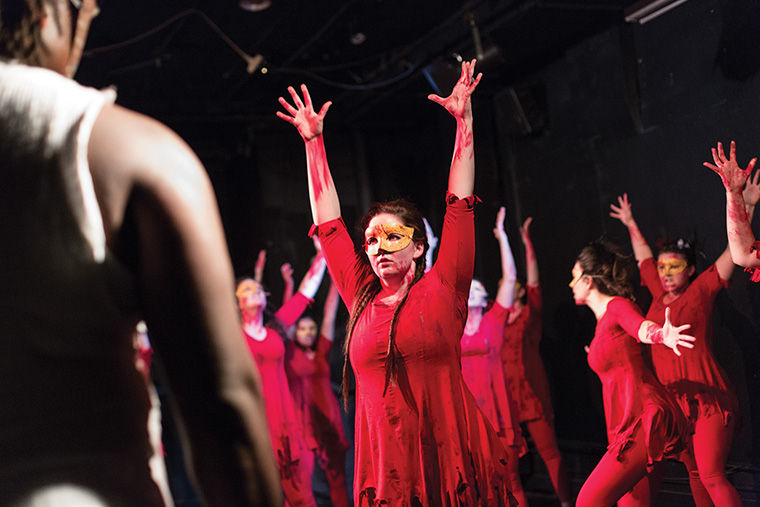‘The Bacchae’ still intoxicates audiences
The Madison Street Theater, located at 1010 Madison St. in Oak Park, will host the production of “The Bacchae” through Sept. 26.
September 8, 2015
The Saltbox Theater Collective of Oak Park brought a revitalized showing of “The Bacchae” to the Madison Street Theater, 1010 Madison St., on Sept. 3. After its Sept. 3 opening, it is scheduled to run Thursdays, Fridays and Saturdays through Sept. 26.
“[It’s] a wild ride,” said director Brian Fruits.
“The Bacchae” portrays public rioting, ecstatic madness and celebration instigated by Dionysius, the god of wine and theater, in rebellion against the repressive King Pentheus, who refuses to acknowledge his divinity.
“The play was written for a society that was patriarchal,” said Albert Williams, a senior lecturer in the Theatre Department. “For Euripides to write [‘The Bacchae’] was very threatening to the power structure of ancient Athens.”
Still, “The Bacchae” is more than just a literary relic best suited to rest upon a scholar’s dusty shelf.
“I remember reading the play and saying this reminds me of things that we are dealing with today in society, in terms of a now-play,” Fruits said. “I could not help but keep hearing or seeing Ferguson … Our Dionysius is an African American actor, our Pentheus is a young, white actor.”
However, this is not the first time similarities have been drawn between “The Bacchae” and modern events.
“The idea of doing the Bacchae to emphasize contemporary relevance.… Every generation has done it,” Williams said. “[It’s] incredibly timeless because what it deals with is the conflict between trying to maintain order in society and the essential primal nature of human experience —the madness inside all of us. It’s about order versus chaos.”
Moreover, “The Bacchae” is a visceral experience as lively as any contemporary musical or drama, according to Williams.
Saltbox has preserved the tradition of a masked chorus, the director noted, which is traditionally as important as the play’s spectacle and story.
“I feel that the body is a text.…I’ve always said the chorus is the lead actor of a Greek play. Yes, we have Pentheus and we have Dionysius, but we have nothing without the chorus,” Fruits said.
“It’s a remarkably physical role,” added Danielle Swanson, chorus leader.
“It takes a lot of mental, physical, and emotional stamina,” Swanson said. “The Greeks were extremely passionate people … [“The Bacchae”] really explores raw emotions. There’s going to be times when the audience feels really uncomfortable, and that’s okay. We want the audience to embrace those feelings as we take them on this journey.”
The term ‘ancient Greek tragedy’ may conjure imagery of old men in togas, dryly musing over philosophical texts. However, Fruits suggested contemporary audiences need not doubt “The Bacchae”is a frenzied roller-coaster ride, more than capable of capturing their attention.
“We have masks, we have echoing, we have stylized dance…We’re rock and roll and we’re ready to go,” he said.
“The Bacchae” runs Thursday-Saturday at 8 p.m. until Sept. 26. Tickets are $15 for students and $20 for adults. Visit thesaltboxtheater.org for more information.








